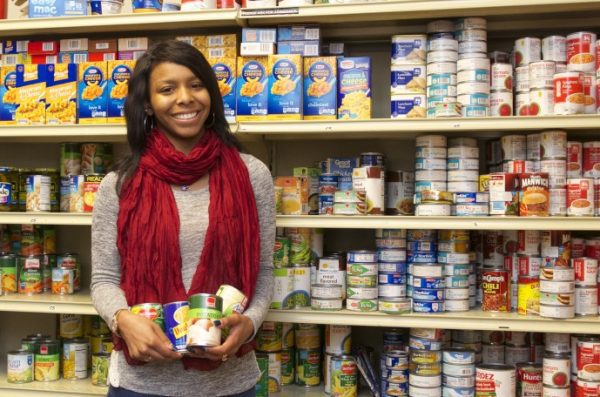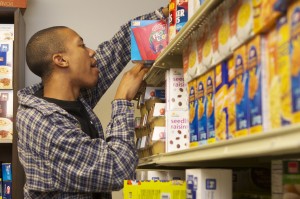Students, Faculty, Staff Address Hunger on Campus With Food Pantry

Students go hungry every day at UNC Charlotte. To address this critical need, a team of students, faculty and staff have opened a campus food pantry.
“Working with the pantry makes me want to do work with international aid and has inspired me,” said senior psychology major Nakiel Coleman. “I would definitely encourage other students to get involved. The food pantry initiative is similar to psychology, in that it provides a service to assist people.” As an intern with the pantry, Coleman is one of the College of Liberal Arts & Sciences students and faculty members who are leaders in the initiative.
The pantry has opened at a time when food insecurity is prevalent in North Carolina. The term describes when someone’s access to food is limited by lack of money or other resources. The national organization Feeding America reports that North Carolina is one of the eight states with statistically significantly higher household food insecurity rates than the U.S. national average. In 2011-2013, the state ranked as the fifth worst at 17.4 percent, with Arkansas, Mississippi, Texas and Tennessee as the worst. Missouri, Georgia and Ohio were also in the bottom eight.
 On a recent day in the pantry in Colvard 3135, Coleman and other students sorted food donations from initiative partners Food Lion and Chartwells and from people on campus and in the broader community. Canned goods and boxes of cereal, grains, raisins and other food staples lined the shelves in the small room near the offices of the Department of Psychology. The pantry also partners with the UNC Charlotte Community Garden for seasonal fresh vegetables and fruits.
On a recent day in the pantry in Colvard 3135, Coleman and other students sorted food donations from initiative partners Food Lion and Chartwells and from people on campus and in the broader community. Canned goods and boxes of cereal, grains, raisins and other food staples lined the shelves in the small room near the offices of the Department of Psychology. The pantry also partners with the UNC Charlotte Community Garden for seasonal fresh vegetables and fruits.
Freshman Emmitt Scott learned about the pantry in a college transition course. “Knowing that there are people on campus that are going without food and wanting to help out motivated me to get involved,” Scott said. “It opened my eyes knowing that you’re in college, and there are different stories. A person may appear one way, but you may not know how they live, and the pantry has shown me that.”
Social Change Depends on Awareness
Psychology professor Kim Buch worked with Sean Langley, assistant director of Off Campus and Volunteer Outreach for the Dean of Students Office, to raise awareness of the need for the pantry.
“Social change doesn’t happen unless people are aware of a problem,” Buch said. “Partnering with Food Lion, Chartwells, and the UNC Charlotte Community Garden shows that there is a critical mass of people working together to combat similar issues and provide change in the community.”
A psychology service learning course Buch teaches in connection with the Psychology Learning Community sparked her interest. The course and learning community allow students to gain volunteer experience on campus, especially service that links to social change or related issues.
Students organize and publicize the pantry, seek contributions and staff the pantry. They greet clients who arrive to pick items from the shelves and help them with paperwork. Each week, the pantry serves 30 to 50 students, who can choose 10 to 15 items weekly.
“The pantry addresses social change by serving students’ food insecurity needs, raising awareness and educating the campus and community about the issue of food insecurity, and providing an on-campus site for service learning,” Buch said. “Through these three goals, the food pantry seeks to contribute to student well-being and enhance learning outcomes for student volunteers and student clients.”
Langley believes that the pantry could address issues such as student retention and raising awareness on campuses nationwide of the need for policy changes to address food insecurity issues.
“There may be a student whose need to eat supersedes their need to get an education and the pantry is one way of combating the food insecurities that students face,” he said. “We’ve had a variety of student clients – students that have families, veterans, undergraduates, graduates, and international students. We’ve also had out-of-state students that maxed out their financial aid and were having to work part-time and were still struggling. Your heart goes out to these students. They’re doing everything right in life, and yet they’re struggling with food insecurity.”
Students can volunteer with the pantry by signing up on the Volunteer Outreach page, located on the student organization portal Orgsync. UNC Charlotte faculty and staff can also contribute to the food pantry through food drives, student referrals and volunteering.
UNC Charlotte’s food pantry plans on expanding. The pantry is currently seeking a larger and more centrally located space that will allow more space for food and more accessibility to students. Volunteers have relied on word-of-mouth to tell others about the pantry, and have recently increased awareness through flyers, brochures, news releases and social media.
UNC Charlotte’s food pantry is open Mondays and Thursdays from 3 to 6 p.m.
Words: Michael Eccles, CLAS Student Communications Assistant
Images: Lynn Roberson, CLAS Communications Director